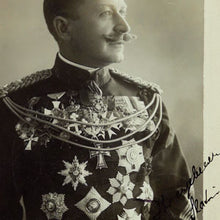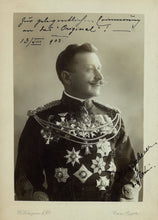Presentation Portrait of Baron von Slatin (Slatin Pasha), 1903
- Regular price
- £1,950
- Sale price
- £1,950
- Regular price
-
- Unit price
- /per
Adding product to your cart
Overall: 29cm (11.4in) x 23cm (9in)
Half length portrait by Lekegian of Cairo, looking right in the uniform of a Lewa (Major-General) of the Egyptian Army, with five rows of frogging across the front and elaborate Austrian knot sleeve decoration denoting rank. Inscribed in the sitters hand and signed ‘R. v. Slatin’ lower right. Framed and glazed.
Rudolf Karl, Baron von Slatin Pasha (1857-1932) was serving as a lieutenant in the Austro-Hungarian army when he received a letter from Charles George Gordon inviting him to Sudan. Slatin arrived in Khartoum in January 1879. He was appointed Mudir (governor) of Dara, and, in 1881, was promoted Governor-General of Darfur. Early in 1882 the tribesmen of Southern Darfur rebelled in the name of the Mahdi. Slatin gallantly defended his province and fought many successful battles, but gradually lost ground. At Om Waragat he lost 800 of his men in 20 minutes and was himself wounded three times but managed to fight his way back to Dara.
Read more
Believing his troops attributed their failure in battle to the fact that he was a Christian, Slatin publicly adopted Islam in 1883 and took the Islamic name, Abd al Qadir. Nonetheless in 1883 he was overwhelmed by the Mahdists and forced to surrender. He remained in captivity for eleven years before escaping in a perilous three week journey across the desert.
He escaped in 1895 and caused a sensation with his book, Feuer und Schwert im Sudan, (Fire and Sword in the Sudan), was instrumental in enlisting support against the Mahdists. After serving with Lord Kitchener (1897–98) in the reconquest of the Sudan, he was named Inspector General of the Sudan in 1900 and served there until 1914. A prominent and charming social figure he was on good terms with Queen Victoria and King Edward VII. After the First World War he met King George V again and was allowed to resume his British decorations.






